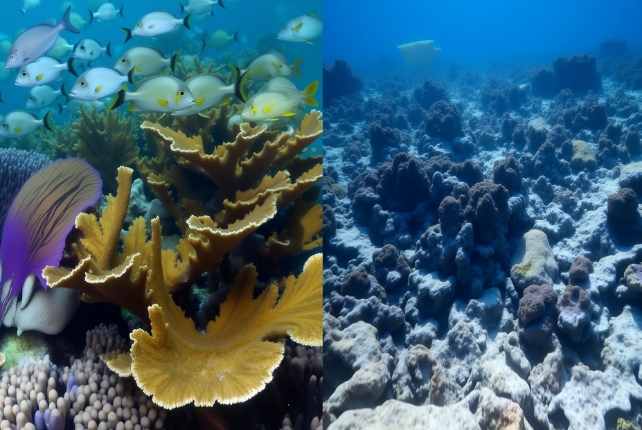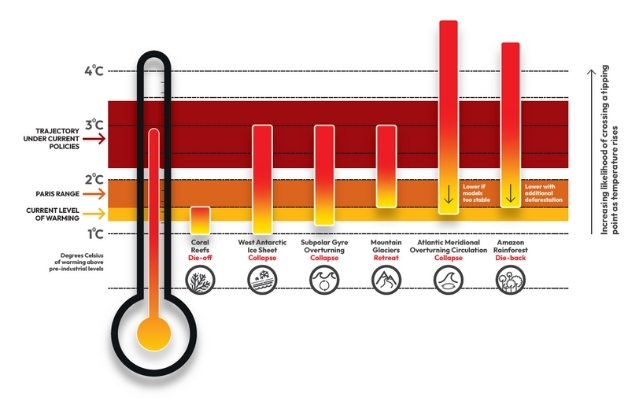It's official: we no longer live on a planet with temperatures that can sustain warm-water coral reefs.
This is the first of many fragile Earth systems set to topple as human activities continue to stoke our planet's fever, the 2025 Global Tipping Points Report warns.
Mass reef dieback occurs at an estimated 1.2 °C warming above preindustrial averages, a point the report – involving 160 scientists across 23 countries – confirms we're well beyond.
"I recognize that engaging with tipping points and talking about these risks is emotionally challenging," University of Oslo sociologist Manjana Milkoreit, who contributed to the report, told ScienceAlert. "Maybe the most important but also most difficult thing anybody can do is not to turn away and ignore this problem."
Earth's most vibrant underwater gardens, from the Great Barrier Reef in Australia to Florida's Sombrero Reef, are being annihilated by human-caused global warming. Four global coral bleaching events have now been recorded, with two of these occurring in the last decade. In this time, the Great Barrier Reef alone bleached in 2016, 2017, 2020, 2022, 2024, and 2025.

"The world has just spent much of the last two years at 1.5 °C warming, and the resulting marine heatwaves have caused unprecedented bleaching of 80 percent of the world's reefs," University of Exeter earth system scientist Tim Lenton told ScienceAlert.
These repeat mass bleaching events are now occurring too close together for reefs to recover, triggering the mass death of corals we're now witnessing and threatening the myriad of creatures that call these once-thriving ecosystems home.
"Half-a-billion people depend on these reefs for their livelihoods, including fishing and coastal protection, and the ecosystem services the reefs provide are valued at over US$2 trillion per year," explained Lenton.
"Reefs can bounce back, but only if we manage to cool things back down again."
On our current trajectory, coral restoration efforts often touted by the media are meaningless unless we can also reduce global temperatures again. Yet still our emissions are rising.
"Current policies are going to likely result in 2.5 – 3 °C warming later this century, risking crossing many irreversible climate tipping points," says Lenton, explaining the next Earth system 'domino' set to topple could be the collapse of part of the West Antarctic ice sheet or the Greenland ice sheet.
"These would accelerate sea level rise in the short term and commit us to multiple meters of sea level rise in the long term."

The report points out that corals are merely the canary in a coal mine. With each fraction of a degree of increased warming, more of Earth's life-sustaining systems will be pushed to the point where they collapse.
"This grim situation must be a wake-up call that, unless we act decisively now, we will also lose the Amazon rainforest, the ice sheets and vital ocean currents," explains WWF-UK chief scientist Mike Barrett. "In that scenario, we would be looking at a truly catastrophic outcome for all humanity."
While there is still uncertainty about the upper limits (the point of no return) of these tipping points, these details do not change the fact that people are already dying as a consequence of climate change, nor do they redirect the actions we can still take to save countless future lives.

The report also explores positive tipping points, where enough positive change has accumulated to make a shift self-sustaining. This includes the way renewable energy, including wind, solar, and battery storage, is now competitive with legacy energy sources.
But the researchers argue the energy transition can be accelerated even further, and that we need to identify and trigger many more positive tipping points – a task that should be prioritized at the COP30 climate talks taking place in November.

Lenton and Milkoreit urge us all to support policies, projects, and organizations involved in climate action, from reducing our meat consumption to nature-based solutions like rewilding to transitioning to clean technologies.

Milkoreit argues the most impactful actions include "advocating for ambitious climate action and tipping point prevention with your elected representatives, supporting organizations that raise awareness about these existential risks, and using your voice."
"Passing these tipping points isn't an abstract future risk, but a present threat to fundamental freedoms, wellbeing, and justice. This report arms citizens with the knowledge to hold leaders accountable."
The full report, its summaries, and case studies can be found here.
